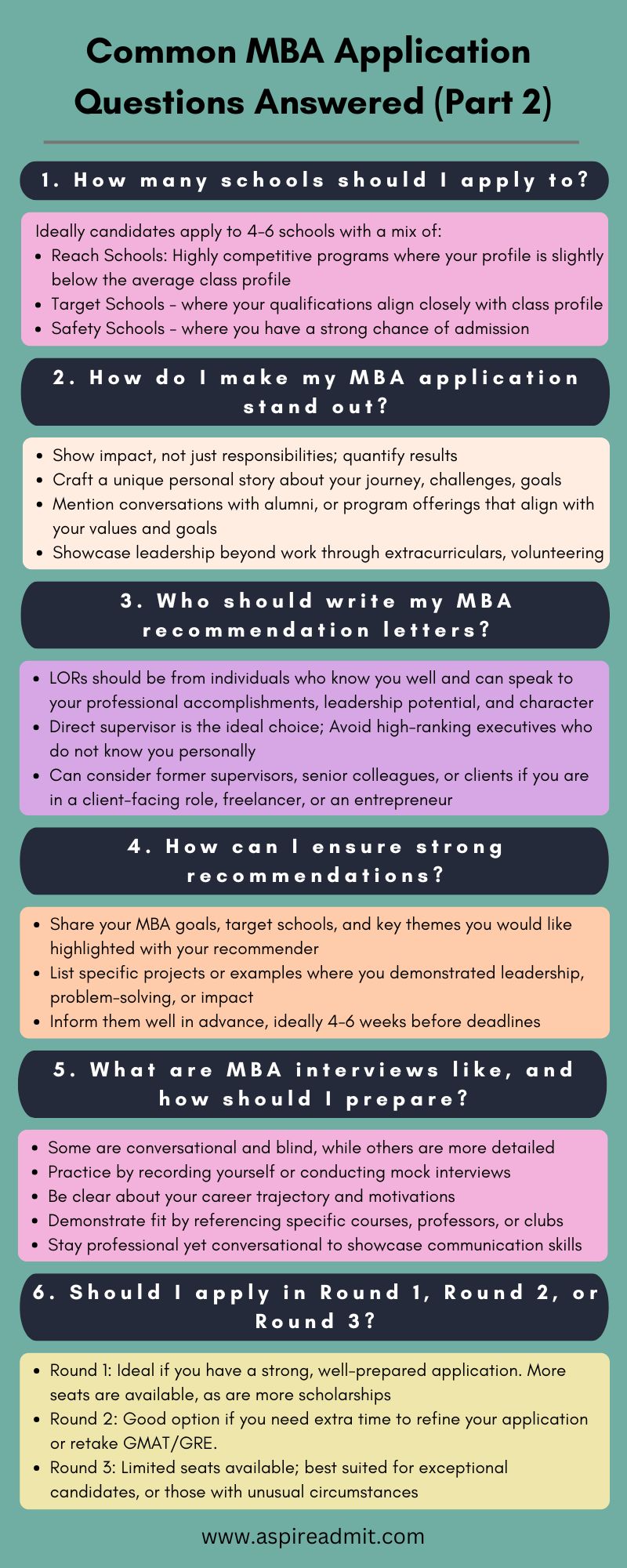Common MBA Application Questions Answered (Part 2)
In the first part of this series, I discussed about essential MBA application topics, including timelines, GMAT vs. GRE, selecting schools, and crafting strong essays. In this post, I am going to discuss a few more of the common MBA application questions covering other key areas, such as recommendation letters, interviews, and ways to stand out in a competitive applicant pool.
1. How many schools should I apply to?
While there is no thumb rule for this, most applicants apply to 4-6 schools with a mix of:
- Reach Schools: Highly competitive programs where your profile is slightly below the average class profile.
- Target Schools: Schools where your qualifications align closely with the class profile.
- Safety Schools: Programs where you exceed the average profile and have a strong chance of admission.
Applying to too many schools can dilute the quality of your applications, while applying to too few may limit your options. Focus on programs that align with your career goals, learning style, and cultural fit.
2. How do I make my MBA application stand out?
With thousands of strong candidates applying to top MBA programs, differentiation is key. Here are some ways you can make your application stand out:
- Show impact, not just responsibilities: Instead of saying, “Led a team in a consulting project,” quantify outcomes like, “Led a team of 5 to streamline operations, reducing costs by 15%.”
- Craft a unique personal story: Admissions committees appreciate authenticity. Reflect on your journey, challenges, and key turning points.
- Demonstrate school fit: Mention specific experiences from school visits, conversations with alumni, or program offerings that resonate with your values and align with your goals.
- Showcase leadership beyond work: Extracurriculars, volunteering, and side projects can strengthen your profile.
- Avoid common pitfalls: Weak storytelling, generic essays or resume can all hurt your application. Ensure your essays are engaging, well-structured, and highlight your career trajectory effectively.
For more strategies to differentiate your MBA application, read this blog post.
Want to Build a Strong MBA Application?
3. Who should write my MBA recommendation letters?
Your recommendations should be from individuals who know you well and can speak to your professional accomplishments, leadership potential, and character. Your direct supervisor is often the best choice, as they can provide concrete examples of your contributions and growth.
However, if asking your current boss is not feasible (due to company policies or other concerns), consider former supervisors, senior colleagues, or even clients if you are in a client-facing role, freelancer, or an entrepreneur. Avoid choosing high-ranking executives who do not know you personally as they will not provide meaningful insights into your profile.
4. How can I ensure strong recommendations?
A great recommendation is specific, detailed, and aligned with your application narrative. Here are some tips to help your recommenders write compelling LORs:
- Provide context: Share your MBA goals, target schools, and key themes you would like highlighted.
- Offer reminders: List specific projects or examples where you demonstrated leadership, problem-solving, or impact.
- Make it easy: Some recommenders appreciate a drafted outline or bullet points (without writing it for them) to guide their responses.
- Give ample time: Inform them well in advance, ideally 4-6 weeks before deadlines
Read this guide on how to get great MBA recommendation letters.
5. What are MBA interviews like, and how should I prepare?
Interviews vary by school, some are conversational and blind (where the interviewer has only seen your resume), while others are detailed and conducted by admissions officers, alumni, or current students.
Common MBA interview questions include:
- Walk me through your resume.
- Why an MBA? Why now?
- Why our school?
- Describe a time you led a team or managed a conflict.
- What are your short- and long-term goals?
- How will you contribute to our MBA community?
Preparation tips:
- Practice aloud: Record yourself or conduct mock interviews with friends or mentors.
- Know your story: Be clear about your career trajectory and motivations.
- Research the school: Demonstrate fit by referencing specific courses, professors, clubs, or cultural aspects.
- Stay professional yet conversational: Schools assess communication skills and presence in interviews.
Read more about how to answer some common MBA interview questions.
Get Your Profile Evaluated
6. Should I apply in Round 1, Round 2, or Round 3?
Timing can impact your chances of admission, financial aid, and scholarship opportunities. Here is a brief breakdown of each round:
- Round 1: Ideal if you have a strong, well-prepared application. More seats are available, and applying early can demonstrate commitment. It is also advantageous for candidates seeking scholarships, as many are awarded in this round.
- Round 2: The most competitive round, but still a great time to apply if you need extra time to refine your application or retake GMAT/GRE.
- Round 3: The final round at most schools, with limited seats available. It is best suited for exceptional candidates, or those with unusual circumstances.
Read this article for an in-depth comparison between the 3 rounds.

Applying to an MBA program is a rigorous but rewarding process. By carefully crafting your narrative, securing strong recommendations, preparing thoroughly for interviews, and avoiding common pitfalls, you can maximize your chances of admission. Good luck!
